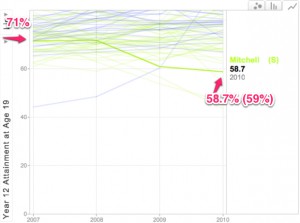We need to be smarter.
The “teachers dispute” is still not settled. Telecommunications, Climate Policy, Labour Market renewal and work such as the Gonski review appear distant references on some future policy horizon.
The treatment of education and skills as a simple cost in a budget, or some “sector” to “manage” fundamentally misunderstands the needs of a modern economy [which wishes to remain one] in this century. Envisioning future Victorian and Australian communities that are literate, numerate, engaged, sustainably employed, self-reliant and generous is the task of all leaders.
By most objective comparative measures, for many years (decades) Australia and/or Victoria have been one of the most high performing societies and economies [I place them in that order] on the planet.
The teaching workforce requires the investment and reform commensurate with the strategic “lever” that it is. Not because it is flawed [although of course there is improvement possible], but because it is one of the only truly public policy levers that can establish and underpin a competitive and harmonious society in to the future.
Yet, as my colleagues in the US would say, we have a Kabuki Dance called the Teachers EBA that suggests the most significant outcome required by Government is saving a few percentage points over the life cycle of one industrial agreement.
There could be nothing less strategic in my view.

At a local level, I note that in the Shire I live in, Mitchell Shire, the Year 12 attainment rate for young people has dropped from 71% in 2007 to a startling 59% in 2010 [the fourth lowest in all LGA’s in the State].
There are a number of other metric’s I could point to, but this serves to make my point I hope.
How does anything that relates to the current position of Government to the teacher’s agreement, suggest this position will or can be improved?
How does having less skilled, less-schooled, less trained individuals in our community good for business or investment, let alone, the individuals themselves or the communities they live in?
My recent observations about the lack of co-ordinated support for telecommunications infrastructure in the region further supports structural inequities that belie the social contract.
Public debate and discourse appears to have collapsed and we have ridiculously doctrinaire views from political parties and commentators that frankly, in the 21st century, serve no-one, except perhaps the [increasingly] narrow self-interests of the few in power. The status-quo is well served.
Scanning the newspapers in New South Wales and Victoria today, provides a stunning treatise of potential corruptions, conflicts-of-interest, self-interest and just plain apparent incompetence that sadly, supports my basic premise.
We need to be smarter.
And ethical.
There appears to be genuine challenges of competence on both sides of the ever-increasingly irrelevant aisles of power.
We have a new Premier of the State and I doubt anyone understands why?
This will cover our news and air-waves for weeks.
It seems if one side of politics says it is raining, the other side will suggest it is sunny and what was once a fearless and informed fourth-estate, chooses to publish the controversy of the disagreement, rather than take the time to look out the window and report the facts.
In the mean-time, tens of thousands of public school educators remain without any reasonable commitment to the individual and profession-wide resources they require to respond to the needs of vastly diverse and rapidly balkanising communities. Evidence-led, place-based planning has never been more critical.
I am reminded of an opine from 2005 [I think from Barry Jones] when he referred to the rise of the “un-reading managerial class” in modern policy circles.
I don’t see what has changed.
While I can be considered a “partisan” [in the broader meaning] when it comes to supporting state education, I do consider myself rationale and collaborative, [Bruce, please don’t snigger..] and thus able to see areas of reform that require all stakeholders to be prepared to compromise the tactical, to achieve a shared strategic vision.
As yet,as far as I can tell, such a vision has not been articulated nor necessarily sought.
Management appears easier.
Nevertheless, the signal to noise ratio is such in public debate, that I simply add my voice to the ocean of noise, if only to satisfy myself and the few hundred colleagues, here and abroad that I share my views with.
Settling the teacher’s Enterprise Bargaining Agreement would be the first indication that we can and want to get smarter.


We need to be smarter. #keepthepromise #viceducation #gonski #skills http://t.co/5GOX3c036q